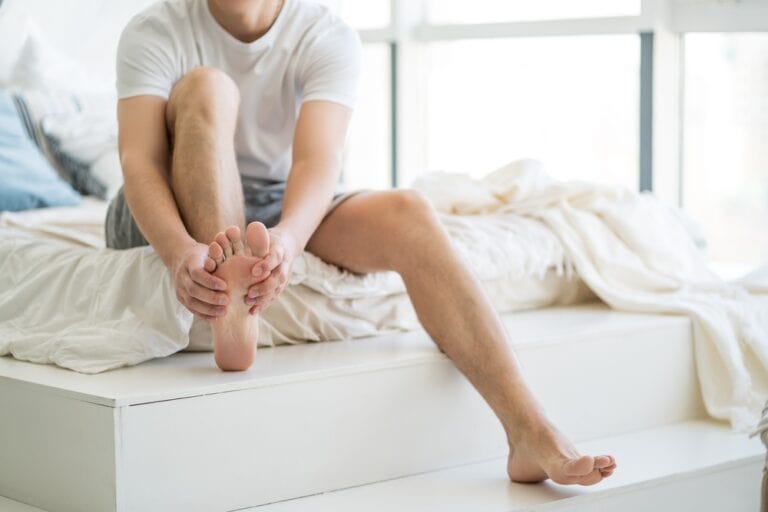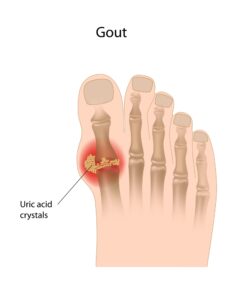
For somebody experiencing the pain of a gout attack, their instinct is to want to alleviate the pain by whatever means necessary as fast as possible. However, steroids, which are a common treatment to reduce the inflammation associated with gout, suppress the immune system. Steroids like prednisone can also cause serious side effects, such as stomach pain, mood changes, or blurred vision, and they can raise blood sugar. Understanding what gout is, how it affects the body, and what you can do to prevent gout attacks can help produce better long-term results with minimal use of steroid medication.
Gout is considered a form of inflammatory arthritis in which uric acid crystals cause pain and swelling in one or more joints. When the human body breaks down chemicals called purines, which are found in certain foods and drinks, it produces uric acid. Normally, this byproduct is filtered out of the blood by the kidneys and is excreted in the urine.

When the body produces too much uric acid, or the kidneys aren’t able to filter it all out, people can develop a condition called hyperuricemia, an elevated level of uric acid in the blood. When this happens, sharp, needle-like crystals of uric acid can begin to concentrate in the joints. The big toe is the joint most commonly affected, but gout can also strike in other joints, including the foot, ankle, knee, hand, wrist, and elbow.
While gout can affect anyone, men are three times more likely to develop the condition than women because they have higher levels of uric acid for most of their lives. Additional risk factors include obesity, congestive heart failure, diabetes, high blood pressure, kidney disease, and a family history of gout.
Lifestyle factors can also contribute to your propensity to develop gout or suffer a repeat attack. If your diet is high in animal proteins, you drink a lot of alcohol, or you are on diuretics, your risk is higher. Red meat, seafood (especially salmon, shrimp, lobster, and sardines), and beer are all high in purines.
A gout attack is usually very painful and comes on suddenly. Symptoms in the affected joint or joints include:
A typical gout attack lasts a week or two; between attacks, patients may experience no symptoms at all. Some people have frequent attacks, while others may go years between episodes, and attacks may not always affect the same joint.
It’s not safe to ignore gout and hope it doesn’t come back after a first attack has passed. When gout isn’t addressed, it can lead to more severe complications, including:
Timely treatment can help prevent and reduce gout attacks and lower the risk of suffering permanent long-term damage to the joints.
If you know or suspect you’re suffering from gout, Corona Foot & Ankle Group can help. We’ll perform a thorough examination to pinpoint the exact cause of your joint pain, then create an individualized treatment plan—including lifestyle changes, pain relief to manage attacks, and/or medications to lower uric acid levels—to keep you and your joints healthy. To schedule your consultation, contact us here today.
Have any questions about treatment? Feel free to make an appointment, Our team will reach you soon!
Contact Us